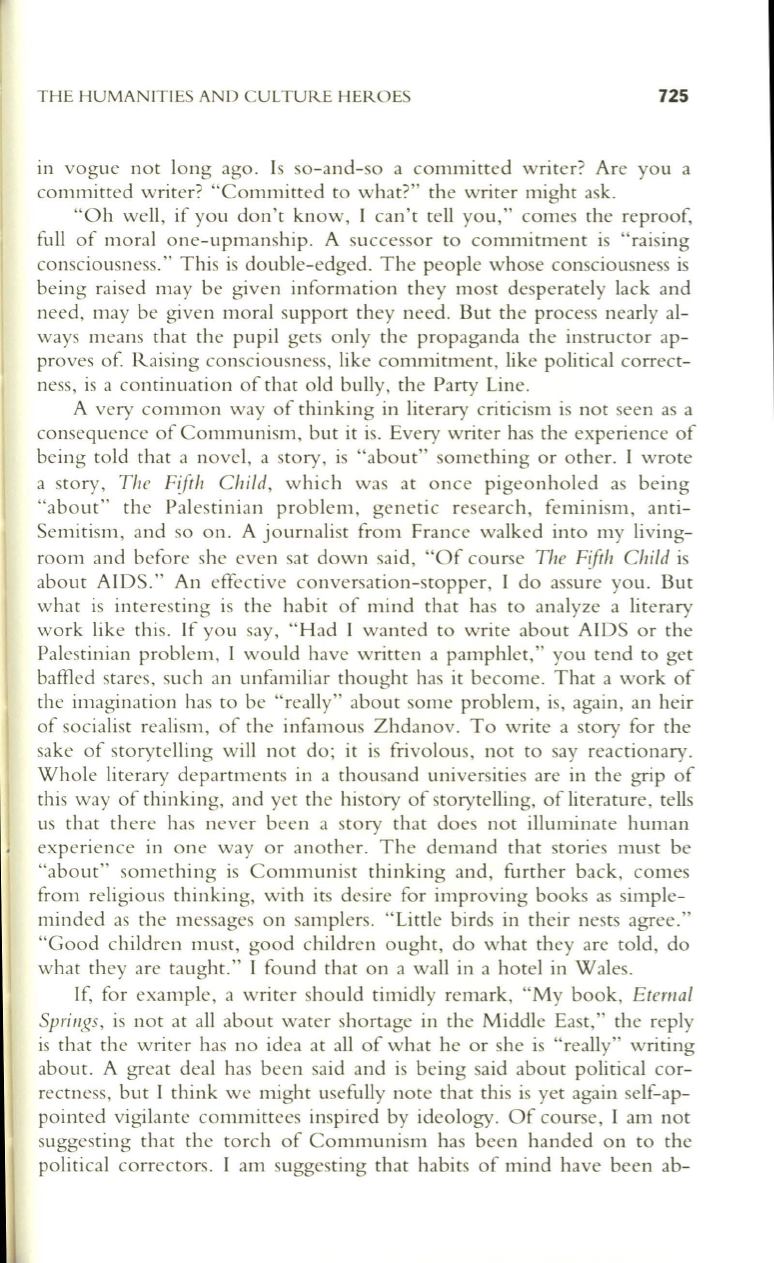
THE HUMANITIES AND CULTURE HEROES
725
in vogue not long ago . Is so-and-so a committed writer? Are you a
committed writer? "Committed to what?" the writer might ask.
"Oh well, if you don't know, I can't tell you," comes the reproof,
full of moral one-upmanship. A successor to commitment is "raising
consciousness." This is double-edged. The people whose consciousness is
being raised may be given information they most desperately lack and
need, may be given moral support they need. But the process nearly al–
ways means that the pupil gets only the propaganda the instructor ap–
proves of. Raising consciousness, like commitment, like political correct–
ness, is a continuation of that old bully, the Party Line.
A very common way of thinking in literary criticism is not seen as a
consequence of Communism, but it is. Every writer has the experience of
being told that a novel, a story, is "about" something or other. I wrote
a story,
The Fifth Child,
which was at once pigeonholed as being
"about" the Palestinian problem, genetic research, feminism, anti–
Semitism, and so on. A journalist from France walked into my living–
room and before she even sat down said, "Of course
The Fifth Child
is
about AIDS." An effective conversation-stopper, I do assure you. But
what is interesting is the habit of mind that has to analyze a literary
work like this. If you say, "Had I wanted to write about AIDS or the
Palestinian problem, I would have written a pamphlet," you tend to get
barned stares, such an unfamiliar thought has it become. That a work of
the imagination has to be "really" about some problem, is, again, an heir
of socialist realism, of the infamous Zhdanov. To write a story for the
sake of storytelling will not do; it is frivolous, not to say reactionary.
Whole literary departments in a thousand universities are in the grip of
this way of thinking, and yet the history of storytelling, of literature, tells
us that there has never been a story that does not illuminate human
experience in one way or another. The demand that stories must be
"about" something is Communist thinking and, further back, comes
from religious thinking, with its desire for improving books as simple–
minded as the messages on samplers. "Little birds in their nests agree."
"Good children must, good children ought, do what they are told, do
what they are taught." I found that on a wall in a hotel in Wales.
If, for example, a writer should timidly remark, "My book,
Etemal
Sprillgs,
is not at all about water shortage in the Middle East," the reply
is that the writer has no idea at all of what he or she is "really" writing
about. A great deal has been said and is being said about political cor–
rectness, but I think we might usefully note that this is yet again self-ap–
pointed vigilante committees inspired by ideology. Of course, I am not
suggesting that the torch of Communism has been handed on to the
political correctors. I am suggesting that habits of mind have been ab-


